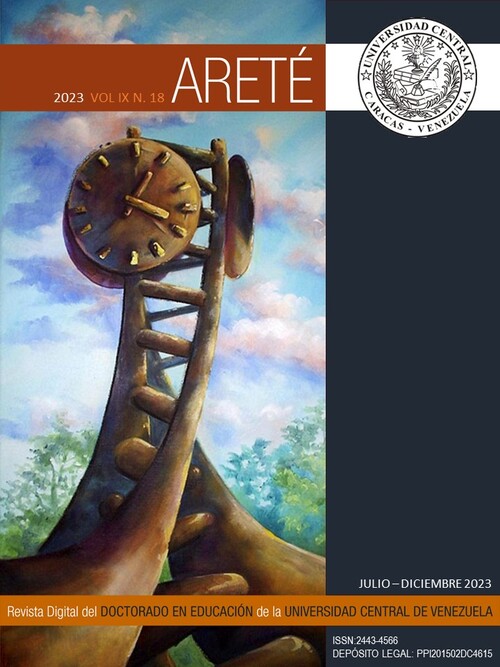The three pedagogical moments: report of an interdisciplinary didactic sequence applied in the 8th grade of elementary school
Keywords:
Three pedagogical moments, Following teaching, Healthy eatingAbstract
The present work is an experience report applied using the methodology of the Three Pedagogical Moments (3MP). The methodology can be used in the development of more dynamic classes, with themes that can be interdisciplinary and that address contexts related to students. This dynamic presents the following structuring concepts: Initial Problematization (IP), Organization of Knowledge (OC) and Application of Knowledge (AC). In this context, we identified potentialities of the 3MP for the organization and development of a Didactic Sequence (SD). Therefore, the objective of the present work is to describe an interdisciplinary experience report on an DS using the 3MP methodology with the theme healthy eating, applied in an 8th grade class of Elementary School in the disciplines of mathematics and science in a public school in Pinhalzinho - State of Santa Catarina, Brazil. Throughout the proposed activities, moments of dialogue were held in which the teachers mediated the production of knowledge. From the conclusions presented in the seminar, one can see the importance of interdisciplinary work articulated between the curricular components of mathematics and science in which students incorporated the experienced reality into learning, which culminated in critical conclusions about their context and the involvement and participation in all stages of the 3MP.
Downloads
References
Araújo, L. B. de y Muenchen, C. (2018). Os três momentos pedagógicos como estruturantes de currículos: algumas potencialidades. Alexandria: Revista de Educação em Ciências e Tecnologia, 1 (1), 51-69. http://dx.doi.org/10.5007/1982-5153.2018v11n1p51.
Brasil. Ministério da Saúde, Agência Nacional de Vigilância Sanitária. Resolução RDC nº 360, de 23 de dezembro de 2003: Regulamento técnico sobre rotulagem nutricional de alimentos embalados. 2003. https://n9.cl/xjlifn.
Brasil. Ministério da Educação (2022). Temas Contemporâneos Transversais na BNCC: Contexto Histórico e Pressupostos Pedagógicos. Brasília: MEC/SEB, 2019. https://n9.cl/eeosoe.
Colares, L. G. T. (2005). Processo de trabalho, saúde e qualidade de vida no trabalho em uma unidade de alimentação e nutrição: uma abordagem qualitativa. 283 p. Tese de Doutorado Ciências na área de Saúde Pública, Escola Nacional de Saúde Pública, Rio de Janeiro. https://www.arca.fiocruz.br/handle/icict/4430.
Delizoicov, D.; Angotti, J. A.; Pernambuco, M. M.; Silva, A. F. G. da (Colab.). (2009). Ensino de ciências: fundamentos e métodos. Cortez, 2009. 364 p.
Fazenda, I. C. A. (2013). Capítulo 1 - Interdisciplinaridade: definição, projeto, pesquisa. En. Fazenda, I. C. A. (coord). Práticas Interdisciplinares na Escola. Cortez.
Lück, H. (2013). Pedagogia interdisciplinar: fundamentos teórico-metodológicos. Vozes.
Pechliye, M. M. (2018). Capítulo 1: sobre sequências didáticas. En: Pechliye, M. M. (org.). Ensino de ciências e de biologia: a construção de conhecimentos a partir de sequências didáticas. Baraúna.
Perini, M., Maifredi, A. M., Nogueira, P. P. F. (2022). Integrando as Ciências: sequências didáticas interdisciplinares de Ciências da Natureza à luz do letramento científico. Dialética.
Rodrigues, C. B. C., Menezes, K. M., Candito, V., Soares, F. A. A., & Muenchen, C. (2020). Three pedagogical moments as structurers of interdisciplinary pedagogical projects in health education. Research, Society and Development, 9(7), e398974247. https://doi.org/10.33448/rsd-v9i7.4247
Taha, M. S., Javorsky, A.de S., Viçosa, C. S. C. L., Soares, E. de L., Sawitzki, M. C. (2107). Valor nutricional dos alimentos: uma situação de estudo à contextualização e interdisciplinaridade no ensino de ciências. Revista Góndola, Enseñanza y Aprendizaje de las Ciencias. Bogotá, Colombia. Vol. 12, nº 2 (ene-jun, 2017), p. 131-141. https://dialnet.unirioja.es/servlet/articulo?codigo=6750743.
Zabala, A. (1998). A prática educativa: Como ensinar. Porto Alegre: Artmed.
Zômpero, A. de F. y Laburú, C. E. (2016). Atividades investigativas para as aulas de ciências: um diálogo com a teoria da Aprendizagem Significativa, Curitiba: Appris, 2016, p. 139.
Downloads
Published
How to Cite
Issue
Section
License
This journal provides free, immediate access to its content under the principle of making research freely available to the public, which fosters a greater exchange of global knowledge.
Authors who publish in Areté, Revista Digital del Doctorado en Educación, agree to the following terms:
- Authors retain copyright and grant the journal the right to be the first publication of the work, as well as licensed under a Creative Commons Attribution License that allows others to share the work with an acknowledgement of authorship of the work and initial publication in this journal.
- Authors may separately establish additional agreements for the non-exclusive distribution of the version of the work published in the journal (for example, placing it in an institutional repository or publishing it in a book), with an acknowledgement of its initial publication in this journal and not to be used for commercial purposes.
- The contents and images included in the articles are the responsibility of the author(s). Areté, Revista Digital del Doctorado en Educación, is not responsible for the information included in them.
- Authors agree with the license of use used by the journal, with the self-archiving conditions and with the open access policy.
- Authors are allowed to disseminate electronically (e.g., in institutional repositories or on their own website) the published version of their work, as it favors its earlier circulation and dissemination and thus a possible increase in its citation and reach among the academic community.
- In case of reuse of published works, the existence and specifications of the license of use must be mentioned, as well as the authorship and original source of publication.







